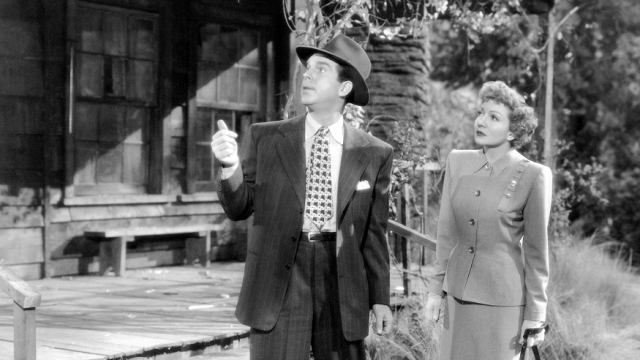Beloved Soluter Son Of Griff once remarked that, despite their reputation, noir movies tended to have better roles for women – more honest, more meaty, and giving them more autonomy – than blockbusters of the past ten or twenty years, and despite it being a breezy comedy, it’s very easy to look at The Egg And I through this context. The fundamental joke that drives the movie is that Betty’s husband is a fool who has upended her life without her permission to dive into a lifestyle they are both clearly wildly unsuited for; she is our viewpoint character and, in the framing device, confidant; we are as surprised as she is when the stove falls apart right at the most inconvenient moment, and as exasperated as she is when her husband’s attempt to cut down a tree destroys their chicken coop exactly as she predicted, and as hurt as she is when nothing she does seems to work – whether the physical labour of running a chicken farm or the social niceties required to navigate the network of a small town.
(As someone who loathes living in small towns, I found a lot to identify with here)
At the same time, I couldn’t help but think of the Hay’s Code as we got to the ending. Now, this film was based on the book of the same name, which was itself based on the true experiences of the woman who wrote it, so I don’t think there’s any kind of nefarious propaganda efforts going on. However, the text of the story is of Betty coming around to her farming lifestyle on the basis of her daughter being born. One of the interesting elements of the movie is that the crew put tremendous amount of work to show how tremendous amounts of work fucking sucks; my favourite part was the stovetop falling apart piece-by-piece after Betty thought she’d fixed it, something that was clearly the product of dozens of people making multiple takes to get the timing perfectly right.
On top of this is the temperamentally conservative structure that supported the creation of this film. One of those old actor jokes I like is that if you ask the guy playing the gravedigger in Hamlet what the play’s about, he’d say it’s about a gravedigger who meets a prince; this reflects the fact that in theater, every actor knows exactly what their job is and focuses on that. One of the things I find endearing about the MCU is that each actor, no matter how high or low, has clearly been briefed on their role and works very hard to live up to it; Old Hollywood has a step up in that the craft and role of screenwriting to the big picture was also very clearly worked out, and so even the one-scene characters have a life to them. My particular favourite is the scene where Betty gets a lift from an older woman and her mother, the latter of whom keeps trying to join the conversation but is ignored by her daughter (to Betty’s embarrassment). We never hear from either character again, and yet here they are, taking up an amount of comedic space.
I see the implication clearly – this is the same kind of social structure supporting Betty in her own town. On my Pet Sematary article, B.S. Miller picked up on my note that a storyteller can only show us what they can conceive and correctly spun it into a positive – this is both the job and wonder of a creative. One of the intriguing things about creatives taking on either adaptations or off-the-shelf plots is seeing the idiosyncratic things they end up imposing onto these stock bodies (another point that Son Of Griff frequently brings up), and which stocks they choose to keep and which they choose to throw. These Hollywood bigshots chose to adapt a story about a group of people coming together to share one experience; it almost makes up for the fact that the ending is kind of weak. I like the shot of Betty staring lovingly at her child, cutting so elegantly from her total despair, but overall they put much less effort into her happiness than they did her unhappiness, which is what makes the whole thing come off a bit like an enforced Code ending.

